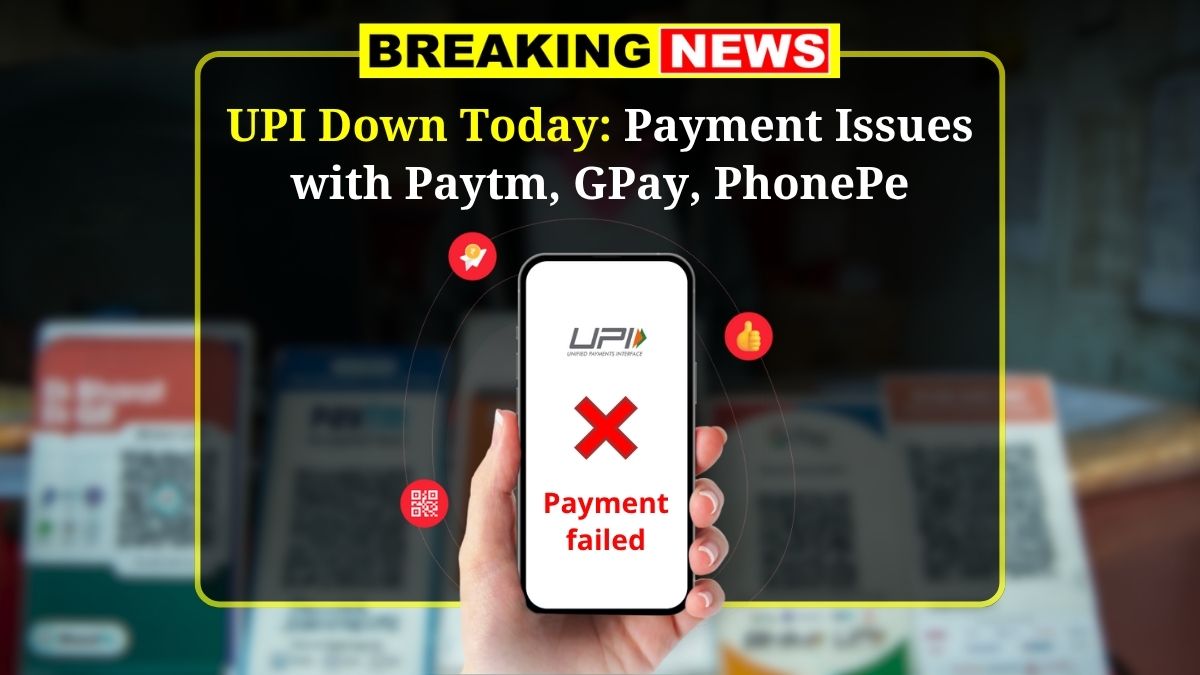UPI Transaction Error – In a rare but frustrating event for digital India, users across the country were hit by a sudden outage in the Unified Payments Interface (UPI) system today, causing major disruptions in online payments. Popular apps like PhonePe, Google Pay (GPay), and Paytm were all affected, leaving people unable to complete their transactions. Whether it was splitting a dinner bill, paying for groceries, or just sending money to a friend, the usually smooth UPI experience hit a serious bump.
Widespread Complaints Flood Downdetector
As soon as the issues started, users began flooding platforms like Downdetector with complaints. Downdetector, which tracks real-time outages by gathering user-reported data, showed a sharp spike in problem reports throughout the day. At the peak of the disruption, around 850 people had flagged issues with UPI on the site.
Most of the complaints—about 62%—were related to failed fund transfers. Basically, people were trying to send or receive money and nothing was going through. Another 21% of users reported problems with the apps themselves—facing glitches, app crashes, or just being stuck on loading screens. The remaining 17% mentioned general issues with payment processing, which could be anything from stuck transactions to unsuccessful payments without clear error messages.
Frustration Mounts as Transactions Fail
Naturally, this caused a lot of chaos for people who rely on digital payments for daily tasks. From paying for cabs and food orders to making utility bill payments, everything was affected. Many users took to social media platform X (formerly known as Twitter) to share their frustration using the hashtag #UPIdown, which quickly started trending.
But amidst all the complaints and confusion, the internet also did what it does best—turned the outage into meme material. Humorous tweets, videos, and jokes made light of the situation, with people joking about how they had to go “old-school” and look for cash.
No Word Yet From NPCI on the Cause
So far, the National Payments Corporation of India (NPCI), which manages UPI, hasn’t released an official statement explaining the cause of the problem. This has left users even more frustrated, as there’s no clarity on when full functionality will be restored or why this even happened in the first place.
Interestingly, today’s outage comes just weeks after UPI faced two similar disruptions last month. Back then, NPCI had explained that the system was overloaded due to an unusually high number of “check transaction status” requests from a single bank. That spike caused delays and instability across the UPI network. But as of now, it’s unclear whether the same issue is responsible for today’s downtime or if something else is going on.
Cybersecurity Concerns Add to the Worry
Another reason why people are particularly anxious this time is the growing concern about cybersecurity threats. Recently, the Indian finance ministry urged all financial institutions, including NPCI, to stay on high alert due to reported hacking attempts, some of which have been linked to actors from Pakistan. However, it’s important to note that there’s no confirmed link between today’s UPI disruption and any cyberattack. The root cause still remains a mystery.
That said, the timing of this outage—coming in the middle of increased cyber vigilance—has understandably raised some eyebrows. With more people relying on digital platforms every day, even a short period of downtime can cause widespread inconvenience and distrust.
A Reminder of How Dependent We’ve Become
If there’s one big takeaway from today’s disruption, it’s just how deeply digital payments are woven into our daily routines. UPI, which has revolutionized how Indians make payments, usually works so smoothly that we hardly notice it. But when it stops working, the impact is instant and widespread. From chaiwallahs to multinational corporations, everyone felt the pinch.
Hopefully, NPCI will address the issue soon and provide a clearer picture of what went wrong—and more importantly, how such disruptions can be avoided in the future. In the meantime, those affected can report their issues on platforms like Downdetector to help track the problem and possibly speed up the resolution process.
Disclaimer
The information provided in this article is based on publicly available user reports and current news at the time of writing. Official updates from relevant authorities such as the NPCI are still pending, and the cause of the disruption may be subject to change as more details emerge.




